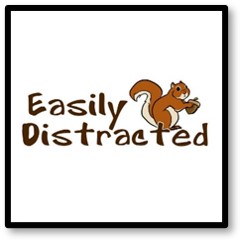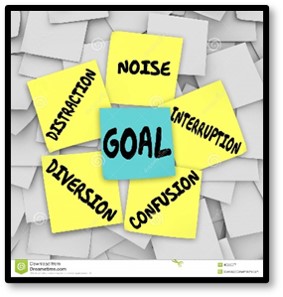Monday Author: Susanne Skinner
If you don‘t pay appropriate attention to what has
your attention, it will take more of your attention than it deserves. ~ David Allen
This is how it starts. I set aside the morning to organize the pantry and suddenly remember I did not order this month’s book club selection. I sit down at my computer and do it. Since I’m already online I decide to look up recipes for peanut-butter cookies and noodle bowls.
 Thirty minutes goes by. Before returning to the task at hand, I read and answer new emails. One is from my brother, sending me flights for his upcoming trip. I immediately go to the kitchen calendar and write them down. While I’m there I make a cup of tea and sit outside and drink it because it’s a gorgeous morning.
Thirty minutes goes by. Before returning to the task at hand, I read and answer new emails. One is from my brother, sending me flights for his upcoming trip. I immediately go to the kitchen calendar and write them down. While I’m there I make a cup of tea and sit outside and drink it because it’s a gorgeous morning.
Two hours pass and my plan to organize the pantry slips away. I become distracted by small tasks that diversify and multiply. I am the victim of attention theft.
Marketing Roots
Attention theft is a concept rooted in marketing. Using a combination of economics and psychology, advertisers show people (potential consumers) content they do not consent to view. There is a high percentage of success with this method because humans are susceptible to what is most noticeable in their immediate bubble.
Uninvited promotional notifications, spam email, and pop-up ads are examples of this practice. Airplanes, taxis and even waiting rooms use their video screens to promote ad content to an unwilling but captive audience. Critics say it is unethical but to date there is no law preventing it.
I experience over-the-top annoyance when a web site is overrun with ads that refuse to go away. They compromise the content flow as well as my ability to read and enjoy it. These are affiliate ads, meaning the owner or author receives compensation for displaying them.
It is increasingly pervasive on my favorite web sites and my loyalty is steadily declining. But I am in control of most other distractions that interfere with the rest of my life. Or am I? Distractions—planned or unplanned—can still monopolize our time.
Squirrel!
I admit to giving in to distractions. I work part time in a home office located in a topical climate on the water. Distractions abound!
 It is difficult to resist the siren’s song of distraction, and easy to fall into the trap of giving our attention to the very things stealing our attention. We become victims of the activities time suck—pursuits to which one devotes time that might be better or more productively spent doing other things.
It is difficult to resist the siren’s song of distraction, and easy to fall into the trap of giving our attention to the very things stealing our attention. We become victims of the activities time suck—pursuits to which one devotes time that might be better or more productively spent doing other things.
Instead of focusing on what we need to accomplish we fall down the rabbit hole of inconsequential things that take up more time than they should. Raise your hand if you sit down for fifteen minutes to “just do this one thing” and when you look at the clock an hour has passed.
Attention Distraction versus Attention Deficit
Attention-deficit disorder (ADD) and attention deficit hyperactivity disorder (ADHD) are chronic conditions that affects children and can continue into adulthood. ADHD includes a combination of ongoing problems including difficulty sustaining attention, hyperactivity and impulsive behavior.
This is not that. Attention distraction is what the words imply—something preventing you from giving your full attention to something else. Attention stealing thieves include social media, email, the lure of a new recipe or book, an appealing craft project, and even the view in my backyard. They allow me to procrastinate about major tasks and sometimes offer me the opportunity to do nothing. With full-time employment and a hectic travel schedule that option was limited to weekends.
Tony Schwartz, author of The Way We’re Working Isn’t Working writes about what happens when demands on our time exceed our capacity. In his article “Take Back Your Attention,” Schwartz describes the appeal of the immediate gratification readily available to us in a thousand different ways. Although he authored the article in 2011, it is even more relevant today as so many of these distractions live on devices we hold in the palm of our hand.
Stay Focused
 Working full time in my field requires a Ninja Level-10 Focus. In event marketing, distraction leads to missed details—and we all know that’s where the devil lives. The job demands discipline and focus. Working part time means my demands are less, and the truth of the matter is that semi-retirement allows me a bit of distraction without penalty.
Working full time in my field requires a Ninja Level-10 Focus. In event marketing, distraction leads to missed details—and we all know that’s where the devil lives. The job demands discipline and focus. Working part time means my demands are less, and the truth of the matter is that semi-retirement allows me a bit of distraction without penalty.
I am no longer at this party full time and don’t operate at warp speed unless I chose to do so. When I am not working, I can indulge myself in a few rabbit-hole diversions, and none of them are unwelcome!
The other truth of the matter is that I just might be a little less organized. With all this free time it’s easy to let things slide and, on rare occasions, be entirely forgotten. I must work a little harder to stay focused and for me that means writing tasks down and setting aside time to complete them—without giving in to distractions.
I am a long-time list maker, it’s in my DNA. My life works best when I think on paper. I see it, do it, and cross it off. I can also let it sit there and focus on other things, but I never lose sight of its presence.
And when distractions steal my attention away from an important task already underway, I take it back and refocus—most of the time.
It’s the Little Things
Sometimes attention thieves are a lot of little things and sometimes it’s one big thing. They are harmless until they consume all your mental energy while failing to move the progress needle.
But not every distraction is negative. In fact, I embrace the little things knowing they are distractions. Sometimes joy comes from the unexpected, even if it’s just a noodle bowl. And once in a while it’s the gift of doing nothing.
I know you feel me. We are kindred spirits.
